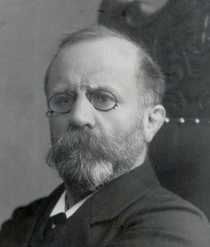Julius Buths
Julius Buths was born on 7 May 1851 in Wiesbaden (Germany). His father was a professional musician and so Julius Buths received a musical education from an early age. As a teenager he studied with composer Wilhelm Freudenberg and continued his studies after school at the conservatory in Cologne under Ferdinand von Hiller and Friedrich Gernsheim and in Berlin under Friedrich Kiel.
After his studies he received a scholarship of the Giacomo-Meyerbeer-Foundation and made a study trip to Italy. Then Julius Buths first settled in Wroclaw where be became the conductor of the local orchestra. In 1879 he moved to Elberfeld (with a reference from Johannes Brahms) and was appointed the municipal music director and head of the local choral society following Hermann Schornstein. In 1890 Julius Buths moved to Düsseldorf where he fulfilled the same positions as successor to Julius Tausch. In 1895 he was appointed royal professor.
Beside his activities as a conductor Julius Buths was also the co-founder (together with Otto Neitzel) of an own conservatory, the so-called Buths-Neitzel conservatory in 1902. He became the first director of this institution which later merged with two other private conservatories to become the Robert-Schumann University. Julius Buths was also the conductor of the teachers choral society of his conservatory and organised chamber music events. As an excellent pianist himself he often participated in these concerts with Max Reger and Joseph Joachim for example. Especially Max Reger was a close friend of Julius Buths and dedicated his Böcklin-Suite to him.
In 1908 Julius Buths quit his position as music director of Düsseldorf due to a dissent with the city council which did not agree with his progressive music policy. But he continued his work as director of the Buths-Neitzel-Conservatory as well as director of the teachers choral society until his death.
Julius Buths died on 12 March 1920 in Düsseldorf (Germany).
Several sources mention that Julius Buths composed works for all genres which indicate that his catalogue is substantial. Curiously I could not find a lot of his compositions listed in those sources, so this is what I found: Piano concerto op. (1870), cantata "Rinaldo" for soli, choir and orchestra op.10, two ouvertures for orchestra, a string quartet (lost), a piano quintet, 6 preludes for piano, songs and a madrigal for choir.
Festzug und Huldigungsfeier am Altare der Ceres
In my possession is the autograph piano reduction of the composition "Festzug und Huldigungsfeier römischer Jünglinge und Jungfrauen am Altare der Ceres" (procession and obeisance ceremony of Roman younglings and virgins at the altar of Ceres) by Julius Buths. The work sets a part of the play "Villa Adriana" into music and is scored for choir and orchestra. The play "Villa Adriana" was written by the German painter August Schlüter (1858-1928) and refers to Hadrian's villa.
The title page of the manuscript provides the information that the play "Villa Adriana" was written by August Schlüter in 1905 for the november festival of the Düsseldorf artists ("Novemberfestspiel der Künstlerschaft"). Julius Buths set a part of this play into music and dedicated his composition to August Schlüter. The work was premiered - according to the manuscript - on 15, 16 and 17 November 1905 at the Städtische Tonhalle Düsseldorf.
